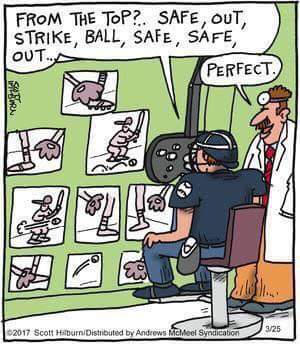This posting is mostly a summary of the material from an article in Referee Magazine, July 2016, written by George Hammond.
Introduction
Moving up as a softball umpire to the next levels of officiating is not a sprint, it is a marathon. Some officials progress faster through the stages than others. Some reach a plateau and find it difficult to advance to the next stage while others might move methodically from one stage to the another. One way of looking at the stages of officiating is to divide them into the “5 M’s.”

Meandering (Happy to Be Here)
With possibly the exception of those few people who start umpiring for the money rather than the passion, most new umpires want to learn as much as possible about their new avocation. New officials have to desire to improve and want to move up to the next levels and accept the fact that they will start at the lower levels. They will need to do a lot of studying and attending clinics. The most successful umpires will also spend time at this stage talking to more experienced umpires to learn the things you cannot get from rule books and mechanics manuals, especially how to deal with coaches, players and spectators.
For new umpires to succeed they need to work as many games as possible, and try to have experienced umpires as their partners. Assigners play a big role in this early phase of a new umpire, as well as the umpire’s organization’s training staff.
Measuring (I Want to Stay Here)
The second stage of officiating could also be named “survival mode.” Some umpires may be afraid to make mistakes. Now that they have had some game experience and have participated in close calls, rule interpretations, arguments, and good and bad mechanics, it is important for them to start doing some serious bookwork – rule books, mechanics manuals, reading articles from Referee magazine, using any and all resources available to them – for example, our Locker Room.
Hopefully somewhere during the first stage an assigner or fellow umpire has suggested to the new official that he or she should pick a mentor for themselves. Again, an assigner or training person can be a big help in this direction. An umpire who wants to rise through the levels will want feedback – both positive and negative. They will address questions and concerns to their fellow umpires as well as their mentor. It is at this stage that an umpire will realize how important the intangible things are:
-
The intent of the rule versus the written rule
-
Looking and being professional at all times – on and off the field
-
Learning from mistakes and making a firm resolution to not repeat it
-
Communication with coaches
-
Handling hostile situations and learning how to diffuse them
